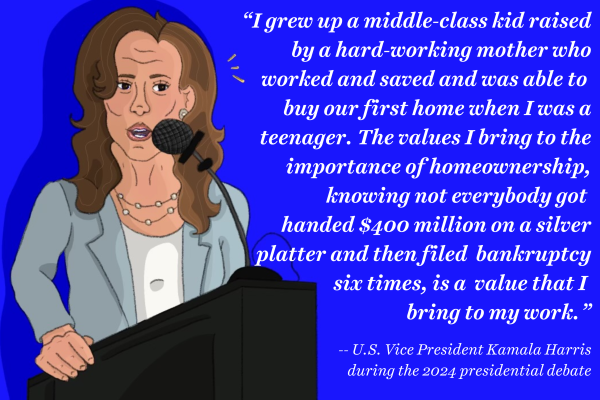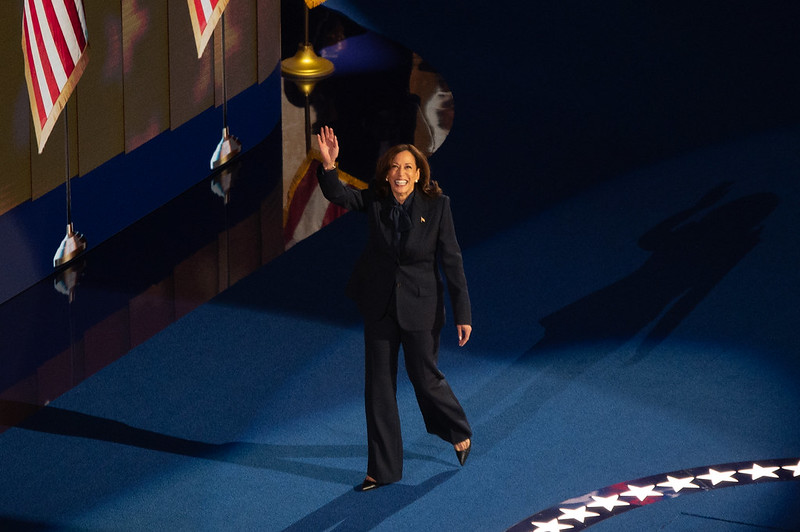Kamala Harris, U.S. Vice President and Democratic nominee for the 2024 presidential election waves to the crowd at the 2024 Democratic National Convention Convention at the United Center in Chicago Illinois on Aug. 22. If elected, Harris would be the first female president of the U.S., bringing a new set of experiences to the position. “In a nation that prides itself on its ‘cultural diversity’ and ‘acceptance of all people,’ it is telling that outwardly, all bar one of its leaders have been the opposite of diverse: white and male,” Managing Editor Jane Ripps wrote. Photo by Eli Raikhel
In a nation that prides itself on celebrating diverse perspectives and progressiveness, electing a powerful female president like Kamala Harris is long overdue.
Energy buzzes throughout the stadium.
People of all races, socioeconomic backgrounds and sexualities unite in support of a candidate who shares the same beliefs of inclusivity and progressiveness. As attendees chant, “We’re not going back,” hope radiates from the stands.
Hope for the possibility of the first female President of the United States.
On July 30, U.S. Vice President Kamala Harris officially launched her campaign for the 2024 presidency in Atlanta, Georgia. When sitting president Joe Biden stepped out of the race and endorsed Harris on July 21, the erstwhile outlandish idea of electing a female president became a much-needed possibility.

An illustration depicts U.S. Vice President Kamala Harris speaking at the 2024 presidential debate on Sept. 10. Unlike former president Donald Trump, Harris’s Republican opponent in the 2024 presidential election, Harris speaks for minorities who often lack representation in government and politics. “Not only does she carry with her the experiences of being a woman, but also what it means to be Black and Asian American in a world often dominated by others,” Managing Editor Jane Ripps wrote. Illustration by Sylvia Robinson, Graphic by Lea D’Angelo
Since the establishment of the U.S. in 1776, there have been 46 presidents. However, as telegraphs have evolved to cell phones and horse-drawn carriages to self-driving cars, all 46 presidents have had one thing in common: they have all been men.
In a nation that prides itself on its “cultural diversity” and “acceptance of all people,” it is telling that outwardly, all bar one of its leaders have been the opposite of diverse: white and male.
However, on Nov. 5, voters now have the chance to rewrite this narrative.
It is time for a new perspective in the Oval Office that has not been represented before. It is time for a strong, capable woman. It is time for Vice President Harris.
“(Almost) every single advanced democracy has produced women in the highest echelons of power. (The U.S. is) an outlier in not having had a female leader,” Alice Kinman, Senior Lecturer in the University of Georgia’s Terry College of Business and former Athens-Clarke County District Commissioner, said. “The day that Biden decided that he would not seek the nomination, and then turned around and endorsed Harris, I (thought), ‘The moment is here.’”
If Harris is elected into office, she will bring with her over three decades of experience as a prosecutor, seven years as a district attorney and nine as the first Black, Asian-American female attorney general of California before becoming Vice President of the U.S. in 2020.
It is time for a new perspective in the Oval Office that has not been represented before. It is time for a strong, capable woman. It is time for Vice President Harris.
Not only does she carry with her the experiences of being a woman, but also what it means to be Black and Asian American in a world often dominated by others.
“The (presidency’s) glass ceiling has not been shattered,” Ross Barkan, journalist and contributing writer to The New York Times Magazine, said. “There are still a lot of white men in the country, (and) that sort of demographic is very well represented in government and politics. Harris, (however), is part of the newer America. The fact that she is biracial is increasingly common, (and) it’s very much a part of her identity.”
As voters cast their ballots, they must remember the future of the U.S. rests in their hands. This centuries-long norm needs to end here, as a new era of political feminism and diversity is due. Those who dare to defy the status quo should not be shoved to the back burner and told to wait for the future.
The future is here and the time is now.
